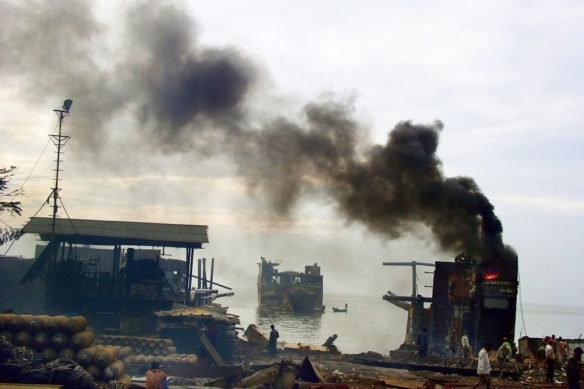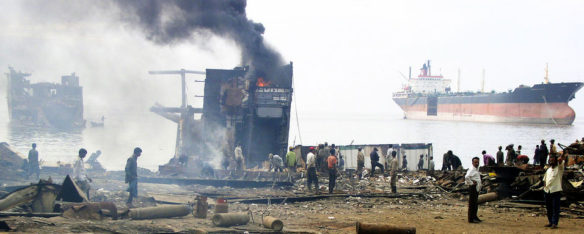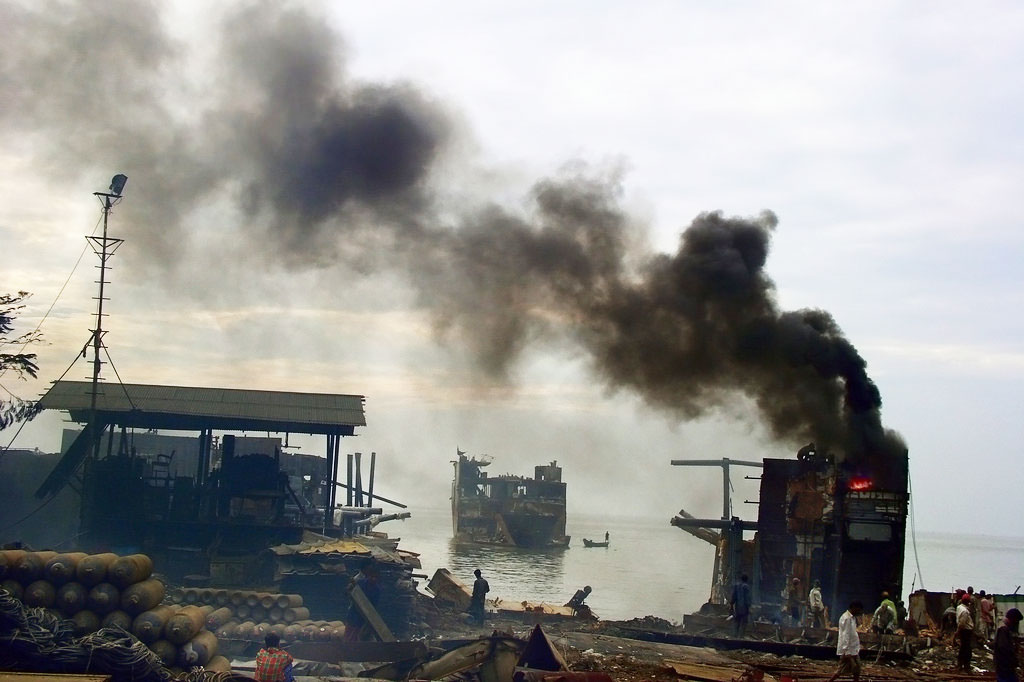
Shipbreaking on the beach, Chittagong, Bangladesh. Photo source: ©© Adam Cohn
Excerpts;
While outwardly against the procedure, 14 ships of its ships were being broken up on open beaches in India and Bangladesh.
The Danish oil and shipping company Maersk finds itself in turbulent seas following the revelations that 14 of its ships were scrapped on notorious beaches in Bangladesh and India in 2013 and 2014.
Outwardly, the company blasted the use of the scrapping beaches, but meanwhile it was reportedly earning money by pushing a German shipping company to try and get the best steel price at the very same beaches for 14 of its ships, according to confidential contracts Politiken, TV2 News and DanWatch are in possession of.
Read Full Article, CPH Post Denmark, (10-17-2016)
Breaking Bad on the Beach, NASA / Earth Observatory (09-28-2014)
Tens of thousands of ships ply the world’s oceans, bays, and rivers. But what happens when those ships have become too old or too expensive to operate? In most cases, they end up on the shores of Asia…literally…
Chittagong Beach Ship Breaking Yards, Bangladesh, Guardian UK (05-05-2012)
Stretched along 12 miles of what just a decade ago was a pristine sandy beach, ore carriers, container ships, gas tankers, cruise liners and cargo ships of every size and description are being dismantled by hand in 140 similar yards, at Chittagong beach Ship Breaking Yard, Bangladesh, the world’s second largest ship breaking area. Every year more than 250 redundant ships, many from Britain and Europe, come here to be broken up…
The Ship-Breakers, National Geographic (05-2014)
In Bangladesh men desperate for work perform one of the world’s most dangerous jobs…
New EU Rules ‘Fail’ Against Shipbreaking Dangers, IPS News (07-17-2013)
The European Parliament’s Environment Committee voted last in favour of a proposal aiming to put an end to European ships being recklessly scrapped in developing countries…
“Ship yard, Bangladesh”: A Photo by Jana Asenbrennerova, National Geographic Photo Contest 2010
“FREIGHTENED – The Real Price of Shipping,” a movie by multi award-winning filmmaker Denis Delestrac-©-2016; (03-31-2016)
90% of the goods we consume in the West are manufactured in far-off lands and brought to us by ship. The cargo shipping industry is a key player in world economy and forms the basis of our very model of modern civilisation; without it, it would be impossible to fulfil the ever-increasing demands of our societies. Yet the functioning and regulations of this business remain largely obscure to many, and its hidden costs affect us all. Due to their size, freight ships no longer fit in traditional city harbours; they have moved out of the public’s eye, behind barriers and check points…
Super-sized ships: How big can they get? Independent (10-21-2014)
Despite the physical limits and risks, ships of more than 450m are anticipated within the next five years…
Worldwide Ship Traffic Up 300 Percent Since 1992, AGU (11-29-2014)
Maritime traffic on the world’s oceans has increased four-fold over the past 20 years, likely causing more water, air and noise pollution on the open seas, according to a new study quantifying global ship traffic…

Shipbreaking, Chittagong, Bangladesh. Photo source: ©© Adam Cohn









